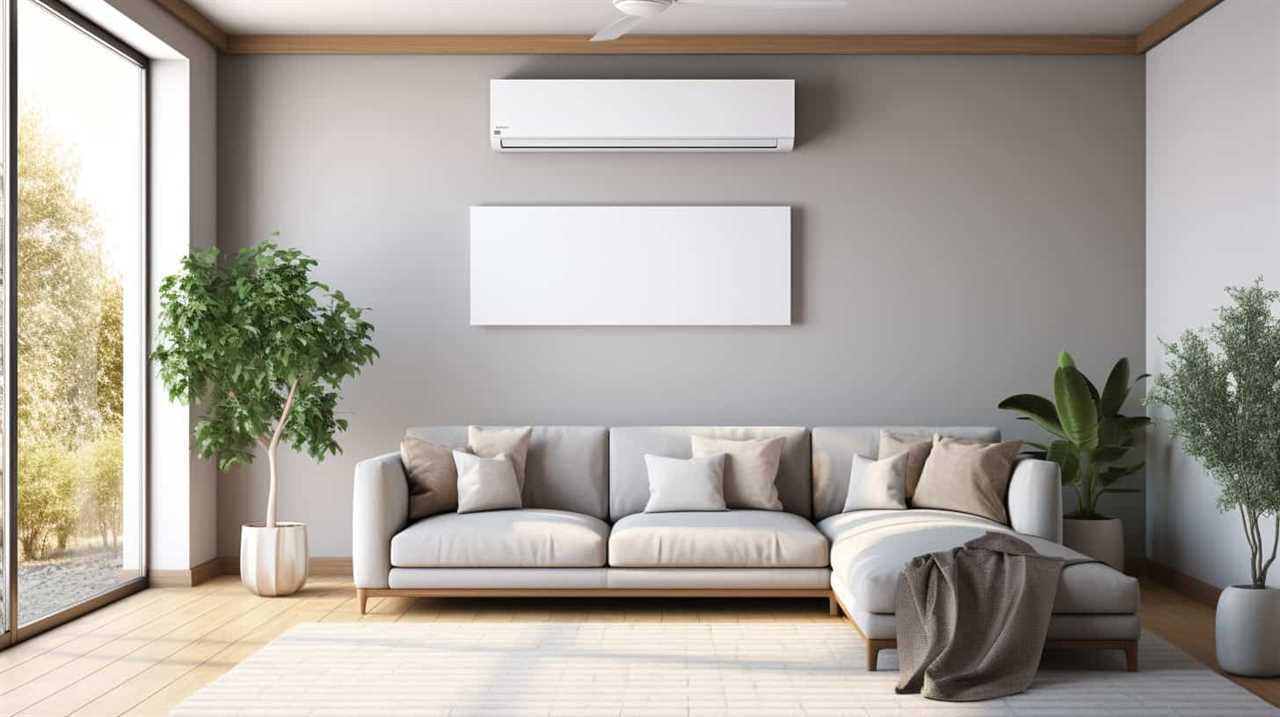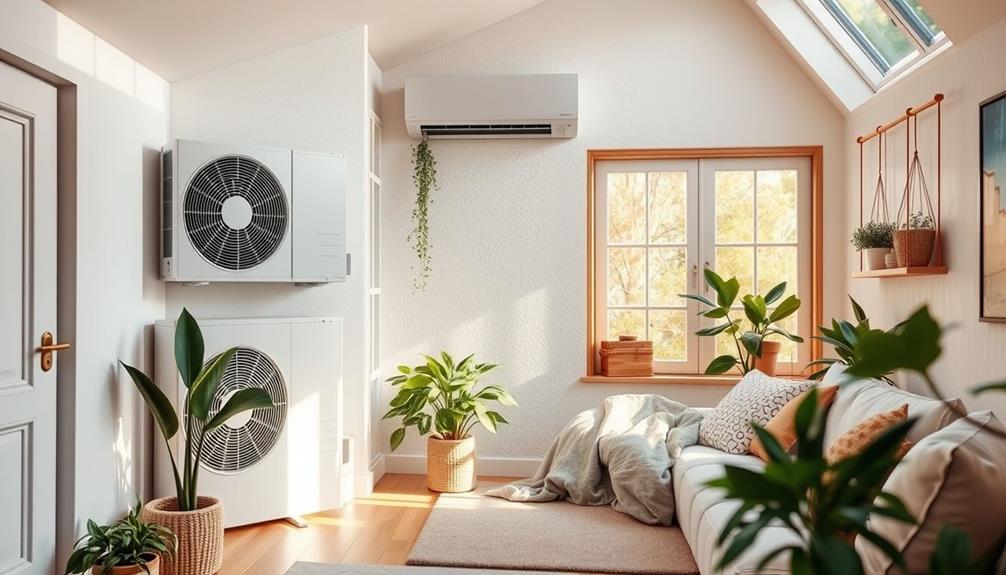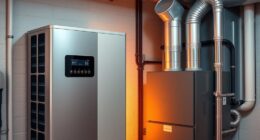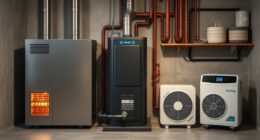Tired of high heating costs and an inefficient heating system at home? We have the ideal solution for you.
Heat pumps are the future of home heating, offering unmatched energy efficiency and cost savings. In this article, we will delve into the benefits of heat pumps, how they work, and why they are the right choice for your home.
Get ready to upgrade your home heating and embrace the innovation that heat pumps bring.
Key Takeaways
- Heat pumps offer unmatched energy efficiency and cost savings compared to traditional heating systems.
- Heat pumps produce fewer greenhouse gas emissions, contributing to a greener future.
- Heat pumps provide versatility and compatibility with various distribution systems.
- Heat pumps are a smart investment for homeowners looking to upgrade their home heating system, offering significant energy savings and decreased environmental impact.
The Benefits of Heat Pumps for Home Heating
We have found that heat pumps provide numerous benefits for home heating.

When it comes to the installation process, heat pumps are relatively straightforward. They require a heat exchanger, an indoor unit, and an outdoor unit. The heat pump installation process involves connecting these components and ensuring proper ventilation and insulation.
Once installed, heat pumps offer significant energy savings. Compared to traditional heating systems, heat pumps can reduce energy consumption by up to 50%. This not only translates to lower utility bills but also a reduced environmental impact.
Heat pumps are highly efficient and produce fewer greenhouse gas emissions, making them a more sustainable choice for home heating. By opting for heat pumps, homeowners can enjoy both cost savings and contribute to a greener future.
How Heat Pumps Work: A Comprehensive Guide
Understanding the operation of heat pumps involves comprehending how they transfer heat from one location to another. Heat pump technology is a revolutionary way to efficiently heat and cool homes, offering numerous benefits over traditional heating systems. Here’s a comprehensive guide on how heat pumps work:

-
Heat Absorption: The heat pump extracts heat from the air, ground, or water source using a refrigerant. This low-temperature heat is then compressed, raising its temperature.
-
Heat Distribution: The heated refrigerant is transferred to the indoor unit, where it releases the heat into the air or water that circulates throughout the house.
-
Reversing the Process: In the cooling mode, the heat pump can reverse its operation, extracting heat from the indoor air and transferring it outside, providing efficient air conditioning.
Heat pumps are highly efficient, with efficiency ratings measured by the Heating Seasonal Performance Factor (HSPF) and the Seasonal Energy Efficiency Ratio (SEER). These ratings indicate the heat pump’s ability to heat or cool a space effectively while consuming minimal energy.

With heat pump technology, you can achieve optimal comfort in an environmentally friendly and cost-effective manner.
Is a Heat Pump the Right Choice for Your Home
When considering whether a heat pump is the right choice for your home, there are two key points to consider: the benefits of a heat pump and its energy efficiency in comparison to other heating systems.
Heat pumps offer numerous benefits, including providing both heating and cooling capabilities, reducing greenhouse gas emissions, and offering long-term energy cost savings.
In terms of energy efficiency, heat pumps are highly efficient, with some models achieving up to 300% efficiency, making them a sustainable and cost-effective heating option for many homes.

Heat Pump Benefits
Let’s explore the benefits of heat pumps and determine if it’s the right choice for your home.
Heat pump technology offers several advantages, making it an attractive option for homeowners looking for innovative heating solutions.
-
Energy Efficiency: Heat pumps are highly efficient and can provide significant energy savings compared to traditional heating systems. They can extract heat from the air or ground, requiring less energy to generate heat for your home.
-
Environmental Impact: Heat pumps produce fewer greenhouse gas emissions compared to fossil fuel-based heating systems. By using renewable energy sources, such as air or ground heat, they contribute to reducing carbon footprints and promoting sustainability.

-
Versatility: Heat pumps can be used for both heating and cooling, providing year-round comfort. They’re also compatible with various distribution systems, including radiant floor heating and forced air.
Now that we understand the benefits of heat pumps, let’s move on to comparing their energy efficiency with other heating options.
Energy Efficiency Comparison?
For our home, we need to compare the energy efficiency of a heat pump with other heating options to determine if it’s the right choice.
When considering energy efficiency, heat pumps offer significant advantages over traditional heating systems. According to research, heat pumps can provide energy savings of up to 50% compared to conventional heating methods. This is because heat pumps transfer heat from the outside environment to warm your home, rather than generating heat directly.

By utilizing this natural heat exchange process, heat pumps reduce the amount of energy required for heating, resulting in lower utility bills and decreased environmental impact. In addition, heat pumps are highly efficient in moderate climates, making them an ideal choice for regions with milder winters.
Considering the energy savings and environmental benefits, it’s clear that heat pumps are a smart investment for any homeowner looking to upgrade their home heating system.
Energy Efficiency: Why Heat Pumps Are a Smart Investment
Heat pumps offer significant energy savings, making them a wise investment for homeowners. When it comes to energy efficiency, heat pumps outperform traditional heating systems in several key ways:
-
Lower energy consumption: Heat pumps use electricity to transfer heat, rather than generating it from scratch. This results in energy savings of up to 50% compared to conventional heating systems.

-
Reduced carbon footprint: By relying on renewable energy sources, such as air or ground heat, heat pumps have a lower environmental impact. They emit fewer greenhouse gases and contribute to a greener future.
-
Year-round comfort: Heat pumps can both heat and cool your home, eliminating the need for separate systems. With their ability to provide consistent and controlled temperatures, they ensure optimal comfort in every season.
Investing in a heat pump not only saves you money on energy bills but also helps protect the environment. Embrace innovation and join the growing number of homeowners who are reaping the benefits of this energy-efficient technology.
Cost Savings With Heat Pumps: What You Need to Know
When considering the cost savings with heat pumps, there are three key points to keep in mind.

First, heat pumps offer energy efficiency benefits, which can result in significant reductions in utility bills.
Second, homeowners may also be eligible for potential tax incentives, further enhancing the cost savings.
Energy Efficiency Benefits
By utilizing heat pumps, we can significantly reduce our energy consumption and save money on our heating costs. Heat pumps are highly efficient heating systems that offer a range of energy efficiency benefits.
Here are three key reasons why heat pumps are an excellent choice for homeowners seeking cost savings and environmental impact:

-
Energy savings: Heat pumps can provide up to 50% more energy savings compared to traditional heating systems. They work by extracting heat from the air or ground and transferring it to your home, rather than generating heat through combustion. This efficient process helps lower your energy consumption and reduces utility bills.
-
Environmental impact: Heat pumps produce fewer greenhouse gas emissions compared to fossil fuel-based heating systems. By using renewable energy sources, such as air or ground heat, heat pumps contribute to a greener and more sustainable future.
-
Incentives and rebates: Many countries and states offer incentives and rebates for installing energy-efficient heating systems like heat pumps. These financial incentives can help offset the initial investment cost and make heat pumps even more affordable.
Lower Utility Bills
We frequently experience lower utility bills when we upgrade to heat pumps. Heat pumps are highly efficient systems that can significantly reduce energy consumption and lower costs. By harnessing the natural heat from the air or ground, heat pumps can provide heating and cooling at a fraction of the energy used by traditional HVAC systems. This increased efficiency translates into substantial savings on monthly utility bills.

In fact, studies have shown that heat pumps can save homeowners up to 40% on their heating and cooling costs compared to conventional systems. Additionally, by reducing energy consumption, heat pumps help to reduce carbon footprint and contribute to a more sustainable future. By following energy-saving tips and investing in heat pumps, homeowners can enjoy lower utility bills while making a positive impact on the environment.
Transitioning into the next section, let’s explore the potential tax incentives available for heat pump upgrades.
Potential Tax Incentives
Fortunately, there are potential tax incentives available for homeowners who choose to upgrade to heat pumps, providing cost savings in the process. By taking advantage of government incentives and tax credits, you can make your home heating upgrade even more affordable.
Here are three key benefits of these potential tax incentives:

-
Tax credits: Homeowners can receive a tax credit of up to 26% of the cost of installing a heat pump system. This can significantly reduce the upfront cost and make the investment more financially viable.
-
Energy efficiency savings: Heat pumps are highly energy efficient, using less electricity than traditional heating methods. This can lead to long-term savings on your utility bills, further offsetting the initial investment.
-
Environmental benefits: Heat pumps are a more sustainable heating option, producing fewer greenhouse gas emissions compared to traditional heating methods. By choosing a heat pump, you can contribute to a cleaner and greener future.
With these potential tax incentives, upgrading to a heat pump becomes a smart financial decision.

Now, let’s explore how heat pumps compare to traditional heating methods.
Heat Pumps Vs. Traditional Heating Methods: a Comparison
When comparing heat pumps to traditional heating methods, one important factor to consider is energy efficiency. Heat pumps are known for their high energy efficiency, as they transfer heat rather than generating it. This means they can provide heating at a fraction of the energy consumption compared to traditional furnaces or radiators.
To illustrate this point, let’s take a look at the following comparison table:
| Heating Method | Energy Efficiency | Environmental Impact |
|---|---|---|
| Heat Pumps | High | Low |
| Furnaces | Moderate | Moderate |
| Radiators | Low | High |
As you can see, heat pumps outperform traditional heating methods in terms of energy efficiency and have a lower environmental impact. This is because heat pumps use renewable energy sources, such as the air or ground, to provide heating, while furnaces and radiators rely on fossil fuels. By upgrading to a heat pump, you not only reduce your energy consumption but also contribute to a greener future.

Heat Pump Installation: What to Expect
After conducting thorough research and selecting a reputable HVAC contractor, our next step is preparing our home for heat pump installation. The heat pump installation process involves several steps that are crucial for a successful installation. Here are three key considerations to keep in mind:
-
Sizing and positioning: The HVAC contractor will carefully evaluate the size of your home and determine the appropriate heat pump size to ensure efficient heating and cooling. They’ll also assess the best location for the heat pump unit to maximize its performance.
-
Ductwork modifications: In some cases, modifications to the existing ductwork may be necessary to accommodate the heat pump system. This may involve sealing leaks, adding insulation, or resizing the ducts to ensure proper airflow and distribution.
-
Electrical requirements: Heat pumps require a dedicated electrical circuit to operate efficiently. Your contractor will assess your electrical system and make any necessary upgrades to ensure that the heat pump is properly powered.

Cost considerations are an important factor when it comes to heat pump installation. The overall cost will depend on factors such as the size and efficiency of the heat pump, any necessary ductwork modifications, and electrical upgrades. It’s essential to discuss these cost considerations with your HVAC contractor to ensure that you’re fully informed about the investment required for your specific installation.
As we move forward with heat pump installation, it’s crucial to understand the maintenance and care required to keep our heat pumps running efficiently.
Maintenance and Care for Heat Pumps: Tips and Tricks
To ensure optimal performance and longevity of our heat pumps, we must regularly perform maintenance tasks and follow a few simple care tips. Proper heat pump maintenance is essential for maximizing efficiency and reducing the risk of breakdowns. Here are some troubleshooting tips and maintenance tasks to keep your heat pump in top shape:
| Maintenance Task | Frequency | Description |
|---|---|---|
| Clean or replace air filters | Every 1-3 months | Dirty filters restrict airflow and reduce efficiency. |
| Clean outdoor unit | Annually | Remove debris and dirt from the unit to prevent airflow obstruction. |
| Inspect and clean coils | Annually | Dirty coils can reduce heat transfer and affect performance. |
In addition to these tasks, it’s important to schedule regular professional maintenance to ensure all components are functioning properly. By following these maintenance tips, you can keep your heat pump running efficiently and avoid costly repairs.

Now that we’ve covered heat pump maintenance, let’s move on to debunking common misconceptions about heat pumps.
Common Misconceptions About Heat Pumps Debunked
Let’s debunk some common misconceptions about heat pumps. These efficient home heating systems have been met with skepticism and misinformation, but let’s set the record straight.
Here are three key misconceptions about heat pumps:
-
They’re only effective in warm climates: Heat pumps are often associated with warm weather, but they can actually work efficiently in colder regions too. With advancements in technology, modern heat pumps can extract heat from the air even when temperatures drop below freezing.

-
They’re less efficient than traditional heating systems: This is a common misconception, but the reality is that heat pumps can be more energy-efficient than traditional heating systems. According to the U.S. Department of Energy, heat pumps can provide up to 300% more heating efficiency compared to electric resistance heating.
-
They’re expensive to install and maintain: While the upfront cost of a heat pump installation may be higher than traditional systems, the long-term energy savings can outweigh the initial investment. Additionally, heat pumps require minimal maintenance compared to other heating systems.
Now that we’ve debunked these misconceptions, let’s explore the future of home heating and why heat pumps are here to stay.
The Future of Home Heating: Why Heat Pumps Are Here to Stay
We believe that heat pumps are here to stay as the future of home heating. Not only do heat pumps provide efficient heating and cooling, but they also have a positive impact on the environment.

Heat pumps operate by transferring heat from one location to another, rather than generating heat directly. This means that they consume less energy compared to traditional heating systems, resulting in lower carbon emissions.
Additionally, heat pumps have the potential to integrate with renewable energy sources such as solar panels, further reducing their environmental impact.
As the world moves towards a future focused on sustainability and renewable energy, heat pumps are poised to play a significant role in the future of home heating. Their efficiency and ability to utilize renewable resources make them an innovative solution for a greener future.
Frequently Asked Questions
Are Heat Pumps Compatible With Existing Heating Systems in Older Homes?
Yes, heat pumps are compatible with existing heating systems in older homes. They can be installed alongside or replace traditional systems, offering efficient heating and cooling while reducing energy consumption and costs.

How Long Does It Typically Take to Recoup the Initial Investment in a Heat Pump?
It typically takes a few years to recoup the initial investment in a heat pump. However, the long-term energy savings and heat pump efficiency outweigh the upfront costs, making it a wise choice for homeowners seeking innovation in home heating.
Can a Heat Pump Provide Enough Warmth in Extremely Cold Climates?
In extreme weather challenges, heat pumps can provide sufficient warmth in cold climates due to their high energy efficiency. They are designed to operate efficiently even in sub-zero temperatures, making them ideal for homeowners seeking innovative and cost-effective heating solutions.
Are Heat Pumps Noisy When They Are Running?
Yes, heat pumps can be noisy when they are running. However, there are noise reduction techniques that can be implemented during the heat pump installation process to minimize the noise and provide a more comfortable living environment.
Do Heat Pumps Require Regular Maintenance and if So, How Often?
Heat pump maintenance is essential for optimal performance. Regular maintenance includes cleaning filters, inspecting coils, and checking refrigerant levels. It is recommended to schedule professional maintenance at least once a year to ensure efficiency and extend the lifespan of the heat pump.

Conclusion
In conclusion, heat pumps are the future of home heating. With their energy efficiency and cost-saving benefits, they provide a smart investment for homeowners.
Contrary to common misconceptions, heat pumps aren’t only reliable but also easy to maintain.
As we embrace the advancements in technology, it’s clear that heat pumps are here to stay. So why not upgrade your home heating system and enjoy the irony of staying warm while saving money and energy?









